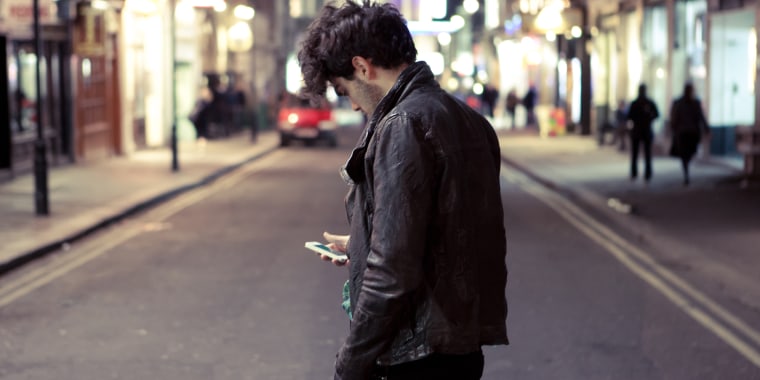It’s lonely out there, even as gadgets connect more people than ever.
Texts, tweets, posts and photos fly around the world, yet their senders often find there’s something missing from their lives.
Dr. Brian Primack is the lead author of a recent study that discovered the more time young adults use social media, the more likely they are to feel socially isolated — lacking fulfilling relationships and a sense of belonging.
“We certainly thought of this as an older person’s problem but what we’re starting to realize is that it is more of a pervasive problem throughout society,” Primack, professor of medicine and pediatrics, and director of the Center for Research on Media, Technology and Health at the University of Pittsburgh, told TODAY.
“The fact that England went to the length of appointing a loneliness minister gives you a sense of how just impactful it seems to be.”
Social isolation now influences a significant portion of the U.S. adult population and there is evidence the prevalence rates are increasing, Julianne Holt-Lunstad, a professor of psychology and neuroscience at Brigham Young University, testified before the U.S. Senate Aging Committee last year. “We are facing a loneliness epidemic,” she noted.
The health implications are huge since loneliness affects a person’s entire physiology. One study found that lacking social connections is as damaging to a person’s health as smoking 15 cigarettes a day.
Humans are extremely social creatures who have evolved over thousands of years to respond to in-person stimuli like eye contact, tone of voice, touch and laughter.
For someone who has no other options — perhaps an older person who lives alone, has trouble getting around and whose friends have died — social media can be a helpful tool to connect. But for younger people who have lots of opportunities to come together through sports, arts, clubs and activities, choosing to socialize through, say, Facebook is not satisfying, Primack said.
"We are facing a loneliness epidemic"
He likes to compare the difference between real life interaction and social media conversations to the difference between eating an apple and Apple Jacks cereal.
“If you’re starving and you have absolutely no source of any sustenance, then Apple Jacks are better than nothing. So that might be what we’re thinking of in the older population,” Primack noted.
“But if you’re sitting in an apple orchard and you’re eating Apple Jacks, that is probably not the wisest course of action… it’s probably a poor substitute for the original.”
Compounding the problem is the impression that everyone else online seems to be having more fun and enjoying a better life. With advertisements, people know the images are manipulated and staged. But social media is just as curated, if not more, even though it seems very real, Primack noted. Your friend smiling on the beach may have taken 200 pictures to post that happy one.
Here’s his advice to stop social media from making you lonelier:
1. Limit alerts
Many people don’t even know how to turn off social media alerts on their phones, so their attention is hijacked every few seconds. It makes it harder to think, be in the moment, interact with others and do everyday tasks, Primack said: “It’s interfering in our life.”
Reflect on whether the alerts are helping or causing problems and consider restricting them.
2. Limit social media platforms
The number of platforms you use is a significant predictor of depression and anxiety, Primack said. If two people both use social media for two hours a day, but one divides that time among just two different sites, while the other posts on eight platforms, the second person is three times as likely to be depressed and anxious, his research found.
“What ends up happening is people get very, very overwhelmed,” he said. “Whereas using a couple of platforms might be more likely to be actually more helpful.”
3. Seek more face-to-face contact
Go over and talk to your co-worker rather than messaging her. Make a lunch date rather than sending a text. Smile, talk and make eye contact when you meet people, or — to follow the earlier analogy — choose apples over Apple Jacks.
4. Stop using social media 30 minutes before bed
One study Primack was involved in showed the 30 minutes before bed time was a particularly important time. Using social media during that half hour was associated with poor sleep among young adults. So put the phone away and let your mind calm at night.
5. Curate your time on social media
It’s easy to get sucked in and be glued to your screen for an hour just scrolling mindlessly. Primack advised limiting your time and being more mindful about it.
Set a timer and allow yourself 25 minutes of catching up with your social media world. Then stop, walk away and talk to people in real life.

